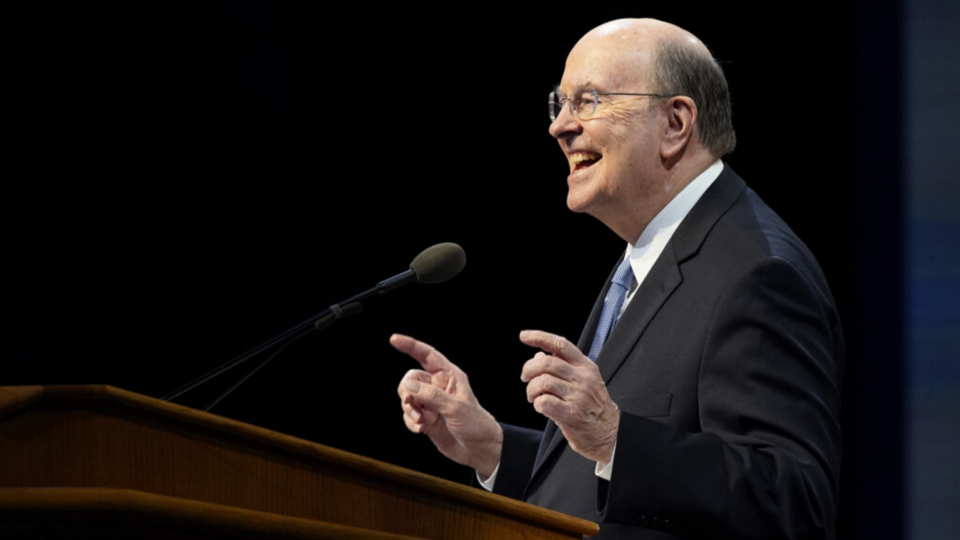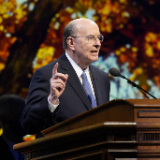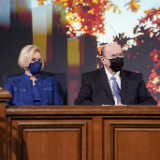| Elder Quentin L. Cook of the Quorum of the Twelve Apostles speaks to an empty Marriott Center on the campus of Brigham Young University on Tuesday, November 10, 2020. Photo courtesy of BYU Photo, courtesy of Church News. All rights reserved. | 1 / 7 |
By Sarah Jane Weaver, Church News
At a time when the world is in commotion, Elder Quentin L. Cook challenged young adults seeking happiness, peace and success to “learn what is essential” and to “avoid detours and stumbling blocks that diminish this protection.”
“My prayer is that you students will have some sense of how precious you are and how much you have to offer,” said Elder Cook of the Quorum of the Twelve Apostles. “My heart has been filled with gratitude for what you have already accomplished all over the world. No generation has been better prepared for the important times that lie ahead.”
Speaking virtually from the empty Marriott Center on the campus of Brigham Young University (BYU) in Provo, Utah, on Tuesday, November 10, Elder Cook addressed the topic “Great Expectations.”
“Our ‘great expectation’ for you is that you will love, serve and worship the Savior, and that you will bless the world like no other generation,” he said, drawing the title of his remarks from the novel by Charles Dickens. “Be determined to continue on the covenant path and to be righteous. With your BYU education, you can be a means of breaking down prejudice, bringing the Church more fully out of obscurity, and building faith in the Lord Jesus Christ.”
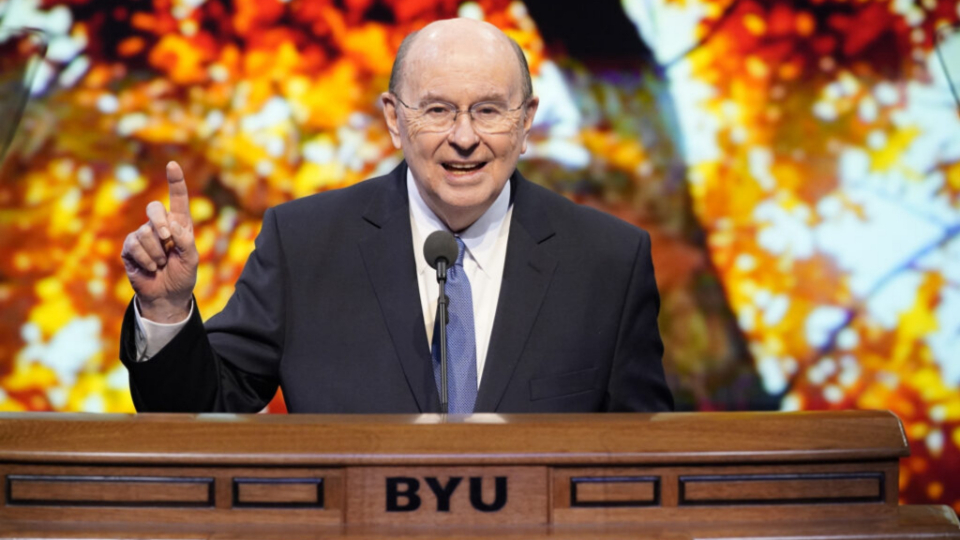
Cook BYU devotional
Elder Quentin L. Cook of the Quorum of the Twelve Apostles speaks on the campus of Brigham Young University on Tuesday, November 10, 2020. Photo courtesy of BYU Photo, courtesy of Church News. All rights reserved.Elder Cook delivered his remarks just two days after Utah Gov. Gary Herbert ordered a statewide mask mandate and halts on extracurricular activities and casual social gatherings amid the escalating COVID-19 pandemic.
“There are many challenges that we face in our day,” Elder Cook said. “The world is literally in commotion.”
The recent national election in the United States has demonstrated a deeply divided citizenry, he added. “Regardless of your political views of that election, the First Presidency, in a letter dated October 6, asked individual members to ‘please strive to live the gospel in your own life by demonstrating Christlike love and civility in political discourse.’”
The Church does not get involved in partisan politics, Elder Cook said. “There are a few matters that we consider important regardless of candidates or parties. We are committed to supporting the founding constitutional documents of the United States — documents that in our doctrine were established for the ‘protection of all flesh’ (Doctrine & Covenants 101:77–80). In other words it was for all people in all nations. In addition, we always support and advocate for religious freedom for all people. We are also committed to doing everything in our power to build faith in the Lord Jesus Christ.”
Referencing an address he gave in August to BYU faculty and staff, Elder Cook mentioned that BYU’s typical incoming class of about 6,000 students is approximately 1,000 more than the first-year classes at Harvard, Stanford and Yale Universities combined and compares favorably in terms of high school GPAs, ACT and SAT scores, and other relevant accomplishments. “As leaders of the Church, we appreciate all our young people and are grateful when they are striving to live the gospel of Jesus Christ and preparing themselves to help build the kingdom of God,” he said.
Throughout Church history, each generation has stood upon the shoulders of the previous generation, Elder Cook said.
He referenced the dramatic immigration of new converts from Britain to the United States in June 1863. At that time, Charles Dickens went on board the passenger ship Amazon, soon to set sail from London to New York and filled with Latter-day Saint converts. Dickens — surprised by what he observed because of the disparaging reports of the Church in British media — described these English converts as the “pick and flower of England.”
Elder Cook said Charles Dickens’ 1861 novel, “Great Expectations,” is “widely considered a masterpiece of English literature.” The novel depicts the growth and personal development of an orphan named Pip and affirms that “affection, loyalty and conscience are more important than social advancement, wealth and class.”
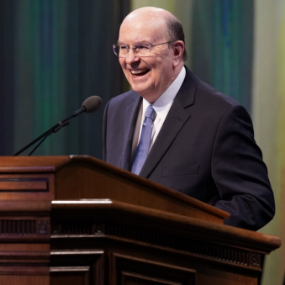
Cook BYU Devotional
Elder Quentin L. Cook of the Quorum of the Twelve Apostles speaks on the campus of Brigham Young University on Tuesday, November 10, 2020. Photo courtesy of BYU Photo, courtesy of Church News. All rights reserved.“I like the fact that two years later, in observing our Church’s converts on the ship Amazon, he could see those same admirable qualities in our members who for the most part came from humble backgrounds,” Elder Cook said.
The title of his talk, “Great Expectations,” reflects “the hopes and aspirations of our Heavenly Parents, of our Savior, Jesus Christ, your earthly parents and the leaders of the Church for each of you and your generation,” Elder Cook said.
“In view of the Savior’s teachings and His great expectations for you, I have chosen to speak about these expectations and what to avoid that keeps you from attaining them,” he said. “One expectation we desire for you is that you stay on the covenant path and keep God’s commandments so you can return and live with Heavenly Father and Jesus Christ in the celestial kingdom with the fullness of happiness and joy promised those who keep the commandments of God.”
Elder Cook divided his remarks to students “at a critical threshold in life” into two important categories: “First, learning what is essential, when the world is in commotion, to protect and bless you and provide the happiness, peace and success you desire. Second, avoiding detours and stumbling blocks that diminish this protection.”
Elder Cook recalled living with his wife, Sister Mary Cook, in California’s Bay Area in the 1960s — a time when the turbulence, anger and social unrest were “similar to what we have experienced recently.”
In the face of this chaos, the Cooks received counsel from President Harold B. Lee, then president of the Quorum of the Twelve Apostles.
“First, build Zion in your hearts and in your homes. Second, be a light on the hill and an example in your community. And third, focus your vision and goals on the ordinances and principles taught in the temple,” Elder Cook recalled. “President Lee promised that we would be protected if we followed these principles, and we could live anywhere in the world.”
Elder Cook told the young adults that these principles are as relevant today as they were over 50 years ago.
“First, as you strive to build Zion in your hearts and homes, please understand the eternal institution of the family is the foundation for happiness,” he said.
A major goal is to commit to the eternal institution of the family, he said. “I assure you that the joy, love and fulfillment experienced in loving, righteous families produce the greatest possible happiness we can achieve. ... It is also the foundation for a successful society.”

BYU Cook devotional
Elder Quentin L. Cook of the Quorum of the Twelve Apostles speaks to an empty Marriott Center on the campus of Brigham Young University on Tuesday, November 10, 2020. Photo courtesy of BYU Photo, courtesy of Church News. All rights reserved.Speaking of being a light on the hill, Elder Cook promised students that as they continue their education and then embark on their various occupations and responsibilities, they can be a powerful force for good. “A very significant challenge,” he said, “will be to adhere to the scriptural injunction to live in the world but not of the world” (John 15:19).
Acknowledging the lack of righteousness in the world today, Elder Cook told students they live in a sacred, holy time. “The Lord has prepared President Russell M. Nelson, our prophet, through many years of temple-related assignments to preside over the Church at a time when temples will truly dot the earth in unprecedented numbers,” he said.
Elder Cook then spoke of the “need to avoid some detours and stumbling blocks that diminish happiness, peace and success.”
Addictions to such things as alcohol, tobacco, vaping, drugs, video games, social media and pornography have been stumbling blocks for the greatest number of people. “The best way to avoid these addictions is to never, ever be involved with them,” he said. “Please avoid these addictions! If you have challenges with any addictions, counsel with your bishop. The Church provides excellent counseling and support.”
In addition to avoiding addictions, it is also important to avoid substituting the philosophies of men for the gospel of Jesus Christ, Elder Cook taught.
“Some assume that what they are learning should supersede the doctrine established by the hand of the Lord. Some are impressed by the complexity of scientific or intellectual learning and are embarrassed by the simplicity of the Savior’s message.”
The philosophies of men have often challenged faith in Jesus Christ and particularly His Resurrection and His Atonement, Elder Cook said.
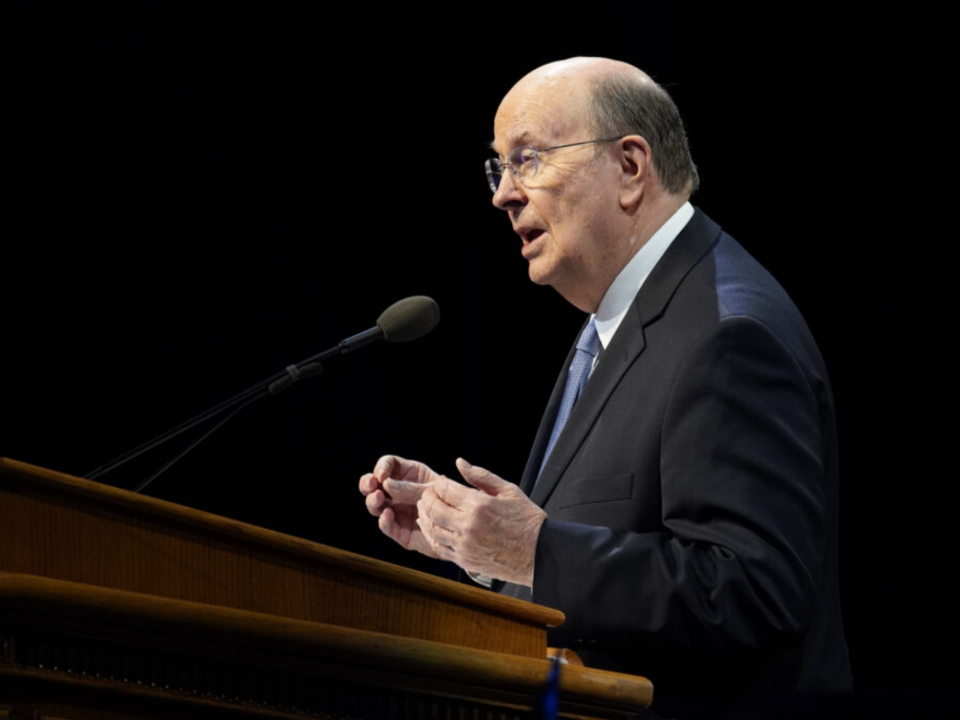
Cook BYU Devotional
Elder Quentin L. Cook of the Quorum of the Twelve Apostles speaks to an empty Marriott Center on the campus of Brigham Young University on Tuesday, November 10, 2020. Photo courtesy of BYU Photo, courtesy of Church News. All rights reserved.Daily consecration is a great blessing, he said. “Heroic gestures or striving for recognition as a substitute for daily consecration should be avoided. … Some members profess that they would commit themselves with enthusiasm if given some great calling that provides recognition, but they do not find gathering Israel worthy of or sufficiently heroic for their sustained effort.”
God uses His children “not according to our works, but according to his own purpose” (2 Timothy 1:9), Elder Cook said. “We are at the very least unwise if our consecration is conditional or based on recognition, or does not involve daily devotion including daily repentance.”
Elder Cook also asked the students to avoid foolishness. “Some are using the internet to create hatred and disunity by only portraying one side of an issue, judging others by one misstatement that is not consistent with how they live their life, and assuming that one communication reveals the inner self and ignoring a commendable life. Tech addiction, particularly pornography, is a serious problem. The sad consequences of this conduct could have been taken from the scriptural warning, “wickedness never was happiness” (Alma 41:10).
Elder Cook counseled students to “avoid all evil conduct that can block happiness, peace and success. Such evil conduct is contrary to God’s commandments and is usually deemed to be a sin.”
Throughout his life, Elder Cook said parents, teachers and mentors have often used the phrase, “Avoid evil like the plague.”
Elder Cook said the recent COVID-19 pandemic has given him insight into the impact of a global plague and a better understanding of the concept of avoiding evil like the plague.
“My challenge to you wonderful students is to learn what is essential, when the world is in commotion, to protect and bless you and provide the happiness, peace and success you desire,” he concluded. “Please avoid detours and stumbling blocks that diminish this protection.”
Copyright 2020 Deseret News Publishing Company
